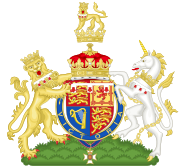Duke of Sussex
| Dukedom of Sussex | |
|---|---|
 Arms of Prince Harry, Duke of Sussex | |
| Creation date | 19 May 2018 (announced)[1] 16 July 2018 (Letters Patent)[2] |
| Creation | Second |
| Monarch | Queen Elizabeth II |
| Peerage | Peerage of the United Kingdom |
| Present holder | Prince Harry |
| Heir apparent | Archie Mountbatten-Windsor |
| Remainder to | the 1st Duke's heirs male of the body lawfully begotten[2] |
| Subsidiary titles | Earl of Dumbarton Baron Kilkeel |
| Status | Extant |
Duke of Sussex is a substantive title, one of several royal dukedoms, that has been created twice in the Peerage of the United Kingdom. It takes its name from the historic county of Sussex in England.
History[]
A title associated with Sussex first appeared with the Kingdom of Sussex, an Anglo-Saxon kingdom that was annexed by the Kingdom of Wessex around 827,[3] that later became part of the Kingdom of England. In charters, Sussex's monarchs were sometimes referred to as ealdormen, or duces in Latin, which is sometimes translated as "dukes".
First creation, 1801[]
The title of Duke of Sussex was first conferred on 24 November 1801 upon Prince Augustus Frederick,[4] the sixth son of King George III. He was made Baron Arklow and Earl of Inverness at the same time, also in the Peerage of the United Kingdom. The title became extinct upon Prince Augustus Frederick's death in 1843.
Although Prince Augustus Frederick was survived by a son and daughter by Lady Augusta Murray, their marriage (purportedly solemnized at St George's Hanover Square Church, Westminster, in 1793) had been annulled for lack of royal permission under the Royal Marriages Act 1772, rendering the children illegitimate under English law and unable to inherit titles from their father. Both children by the annulled marriage died childless, rendering the issue of their inheritance moot.
On 2 May 1831, Prince Augustus Frederick married secondly (and again in contravention of the Royal Marriages Act 1772), Lady Cecilia Gore at Great Cumberland Place, London. Not being the Prince's legitimate wife, Lady Cecilia could not be received at court. On 30 March 1840, she was given the title of Duchess of Inverness in her own right by Queen Victoria.[5]
Second creation, 2018[]
In 2018, the dukedom of Sussex was recreated and granted to Prince Harry, the grandson of Queen Elizabeth II and great-great-great-great-great grandnephew of the previous Duke, to mark the occasion of his wedding to Meghan Markle, who thereby became the first ever Duchess of Sussex.[1][6] On 19 May 2018, it was announced that Prince Harry would become Duke of Sussex in England, with the subsidiary titles of Earl of Dumbarton in Scotland and Baron Kilkeel in Northern Ireland. In 2019, an heir to the dukedom, Archie Mountbatten-Windsor, was born.
In 1999, before the wedding of Prince Edward, the youngest son of Queen Elizabeth II, some had suggested the dukedoms of Sussex or Cambridge as the most likely titles to be granted to him. Instead, Prince Edward was created Earl of Wessex, and it was announced that he would eventually be created Duke of Edinburgh, a title then held by his father, Prince Philip.[7]
There was again speculation that Prince William might be given the Sussex title on his wedding to Catherine Middleton in April 2011,[8] but he was instead created Duke of Cambridge.
Dukes of Sussex[]
1801 creation[]
| Duke | Portrait | Birth | Marriage(s) | Death |
|---|---|---|---|---|
| Prince Augustus Frederick House of Hanover 1801–1843 also: Earl of Inverness and Baron Arklow (1801) |

|
27 January 1773 Buckingham House, London son of King George III and Queen Charlotte |
4 April 1793 Lady Augusta Murray 2 children 2 May 1831 Lady Cecilia Underwood No children |
21 April 1843 Kensington Palace, London aged 70 |
| Prince Augustus' marriage to Lady Augusta Murray, which produced two children, was invalid under the Royal Marriages Act 1772 (he had not asked his father's approval to marry); so, accordingly, all his titles became extinct on his death. | ||||
2018 creation[]
| Duke | Portrait | Birth | Marriage(s) | Death |
|---|---|---|---|---|
| Prince Harry House of Windsor 2018–present also: Earl of Dumbarton and Baron Kilkeel (2018)[1] |

|
15 September 1984 St Mary's Hospital, London son of Charles, Prince of Wales, and Diana, Princess of Wales |
19 May 2018 Meghan Markle 2 children |
– now, 37 years, 102 days old |
Family tree[]
| King George III (1738–1820 r. 1760–1820) | |||||||||||||||||||||||||||||||
| DUKE OF SUSSEX, 1801 | |||||||||||||||||||||||||||||||
| King George IV (1762–1830 r. 1820–1830) | King William IV (1765–1837 r. 1830–1837) | Prince Edward Duke of Kent and Strathearn (1767–1820) | Prince Augustus Frederick Duke of Sussex (1773–1843) | ||||||||||||||||||||||||||||
| Queen Victoria (1819–1901 r. 1837–1901) | |||||||||||||||||||||||||||||||
| King Edward VII (1841–1910 r. 1901–1910) | |||||||||||||||||||||||||||||||
| King George V (1865–1936 r. 1910–1936) | |||||||||||||||||||||||||||||||
| King Edward VIII (1894–1972, r.1936) | King George VI (1895–1952 r. 1936–1952) | ||||||||||||||||||||||||||||||
| Queen Elizabeth II (1926–present r. 1952–present) | |||||||||||||||||||||||||||||||
| Prince Charles Prince of Wales (1948–present) | |||||||||||||||||||||||||||||||
| DUKE OF SUSSEX, 2018 | |||||||||||||||||||||||||||||||
| Prince William Duke of Cambridge (1982–present) | Prince Harry Duke of Sussex (1984–present) | ||||||||||||||||||||||||||||||
| Archie Mountbatten-Windsor (2019) | |||||||||||||||||||||||||||||||
See also[]
References[]
- ^ a b c Prince Harry and Ms. Meghan Markle: Announcement of Titles, The Royal Household, 19 May 2018.
- ^ a b "No. 62358". The London Gazette. 20 July 2018. p. 12928.
- ^ Edwards, Heather (2004). "Ecgberht [Egbert] (d. 839), king of the West Saxons in the Oxford Dictionary of National Biography". Oxford University Press. Retrieved 22 June 2014.
- ^ "No. 15429". The London Gazette. 24 November 1801. p. 1403.
- ^ "No. 19842". The London Gazette. 31 March 1840. p. 858.
- ^ "Meghan Markle's royal title is Duchess of Sussex". The Independent. 17 April 2018. Retrieved 23 May 2018.
- ^ "His Royal Highness was born with the title Prince Edward, as he is a son of The Sovereign. He was created The Earl of Wessex and Viscount Severn on his marriage in 1999". Royal.gov.uk. Archived from the original on 3 March 2016. Retrieved 2016-01-09.
- ^ "Kate Middleton will inherit a host of titles". Cambridge News. 16 November 2010. Archived from the original on 27 July 2014. Retrieved 22 April 2014.
- Dukes of Sussex
- Dukedoms in the Peerage of the United Kingdom
- Noble titles created in 2018
- Noble titles created in 1801
- Prince Harry, Duke of Sussex
